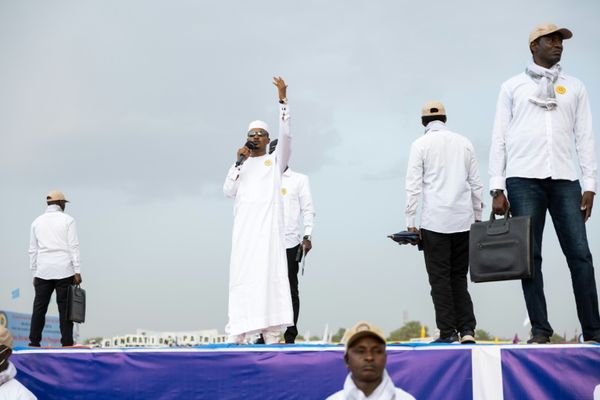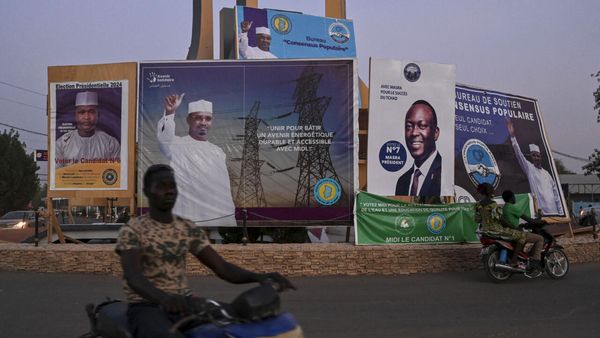
Ten candidates are in the running for Chad's May 6 presidential election, but the race is dominated by the two frontrunners: General Mahamat Idriss Déby, who is currently serving as transitional president, and Prime Minister Succès Masra. Once a leading opposition figure, Masra has come under fire from other critics of the regime, who suspect him of striking a secret deal with Déby’s government.
Campaigning is in full swing in Chad, where the current transitional president, Mahamat Idriss Déby, will face his first test at the ballot box in the May 6 presidential election.
In power since April 2021, the current leader was proclaimed president by the army on the death of his father, Idriss Deby, who was killed on the battlefield after ruling for more than 30 years. Mahamat Déby, 40, had initially pledged to move to civilian rule after an 18-month transition before extending that period and finally announcing his candidacy for president.
Other candidates include former prime minister Albert Pahimi Padacké; Higher Education Minister Lydie Beassemda, the only woman in the race; and the current prime minister, Succès Masra, who is the opposition’s main hope.
A high-profile confrontation between the transitional president and the prime minister, whom Déby himself appointed on January 1, has been the focus of attention in the campaign. Indeed, before making a deal with the military government, Masra, 40, was considered the regime's fiercest opponent.
He staunchly opposed Déby’s ascension to power in 2021, labelling it a "coup d'état" and calling for demonstrations.
On October 20, 2022, an opposition rally organised to protest against the two-year extension of transitional rule turned into a bloodbath. In what became known as “Black Thursday", dozens were killed when soldiers and police opened fire on demonstrators.
The repression was accompanied by hundreds of arrests. Masra went underground and left the country.
His return to Chad a year later, thanks to an agreement with the regime, and his subsequent appointment as prime minister drew the wrath of several other opposition figures, who were quick to denounce him as a traitor.
Read moreChad interim ruler Mahamat Deby favorite to win presidential election
Backroom deal?
Masra’s announcement of his candidacy for president on March 10 further stoked controversy. Max Kemkoye, spokesman for the second-largest opposition platform, the GCAP (Groupe de Concertation des Acteurs Politiques), was quick to react: "It's a farce, a sham candidacy to support the head of the military government."
Despite his political record in opposition, doubts persist as to the sincerity of Masra’s commitment. Since joining the government, the leader of the Transformers party has softened his stance, advocating reconciliation with the government, which he had accused of perpetuating the Déby dynasty and orchestrating the bloody repression of October 20.
This change in tone lends support to the theory put forward by many observers of a secret agreement existing between the transitional president and the prime minister, enabling the latter to run for president while ensuring he will keep his job in the event of a defeat at the polls.
"To legitimise his power within his own camp, Mahamat Idriss Déby needs to beat a major political opponent," explained one analyst, an expert on Chadian politics who spoke on condition of anonymity. "For his part, Succès Masra knows that a good performance in the presidential election will guarantee him a more equitable share of power as head of the next government."
Questioned on FRANCE 24 and RFI, the president of the transition affirmed that the only agreement reached with Masra was to allow his return to the country, denying any electoral pact with a view to the election. The prime minister, for his part, was more evasive: "If there is an agreement, let’s see it.”
“I signed an agreement which guarantees my political rights, which enables Chad to embark on the path of national reconciliation," he said.
Déby the favourite, but Masra has strong support
Despite the criticism, Masra's campaign has generated enthusiasm on the ground, particularly in the south of the country, the opposition stronghold from which he hails. On April 28, thousands of supporters cheered the prime minister in the city of Moundou, where he promised to restore equality, justice and dignity to the people.
"Succès Masra chose to act from within by joining the government. This decision enabled him to benefit from the means to organise his campaign and capture the attention of public opinion," said Makaïla Nguebla, a journalist and former human rights adviser to the presidency. "Today, all the media are talking about Succès Masra, and this rise in popularity puts the regime in a very uncomfortable position."
Masra, a former economist at the African Development Bank, is a dynamic campaigner and can point to his economic expertise to win support in Chad, one of the world's poorest countries, faced with galloping inflation and recurring electricity shortages.
By all accounts, however, Déby remains the clear favourite in the election. Backed by a coalition of over 220 parties, including his late father's powerful Patriotic Salvation Movement (MPS), he enjoys the support of the Arab-Muslim northern clans that have dominated the country politically for the past 40 years.
"By joining the government and then running in the presidential election, Succès Masra has chosen to take the only path that allows him to exist politically," explains the Chad expert contacted by FRANCE 24. "His aim is to impose a real power-sharing agreement at the top while charting his own course, with the next elections in his sights: legislative, municipal and local."
Journalist Makaïla Nguebla fears that the election could plunge the country into a cycle of violence. "It's obvious that the Chadian army has no intention of relinquishing power. What will happen if Succès Masra achieves an electoral breakthrough and claims victory? A bloody confrontation is quite possible."
Read moreChad court bars key Déby opponents from May 6 presidential vote
The election is taking place in a tense political climate in Chad following the death of one of the country's main opponents, Yaya Dillo, in a police raid on his campaign headquarters – and in the absence of several other Déby rivals who have been barred from the ballot.
It is also taking place against a backdrop of restricted freedom of expression, with several media outlets suspended in the run-up to the vote.
For his part, the prime minister continues to walk a tightrope. Expressing confidence in his chances of securing "victory in the first round", Masra reaffirmed on Monday that, as head of state, he would reserve "a place" at his side for Déby and his current team.










